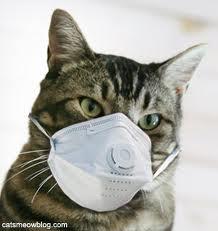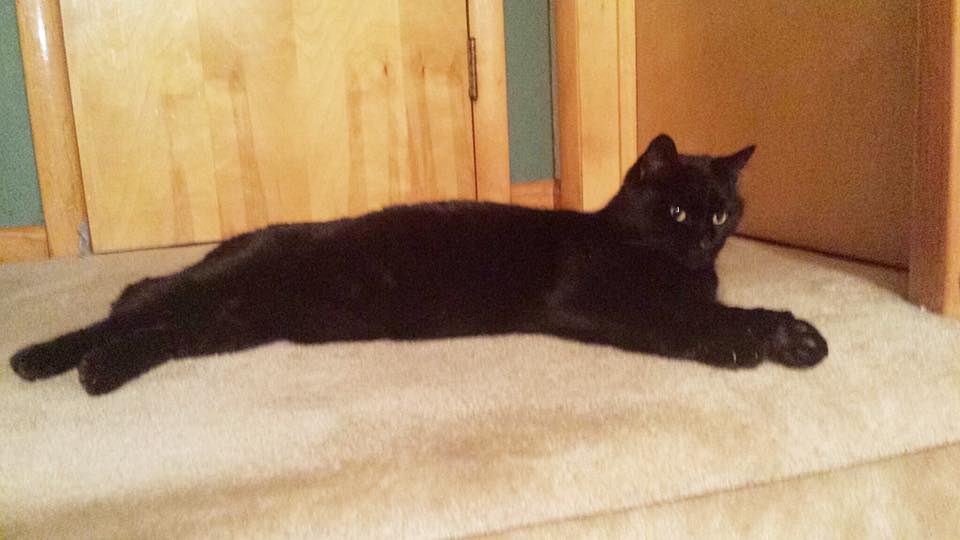Thanks to Amber Kingsley, who researched and wrote this article. We hope people will take heed. We have heard too many stories of people who won’t take their children to visit Grandma because her kitty has runny eyes or a runny nose, or worse yet, people who put their dogs or cats down because they seem to have a chronic “cold” although the pet is otherwise healthy, eating well and enjoying life.
We humans often suffer from the common cold or a flu virus. When we get sick, we tend to steer clear of other people so as not to transmit the infection and “spread disease”. Because these illnesses spread quickly among ourselves, we may assume that our pets are also capable of transmitting their colds and upper respiratory infections to us.

In our great-grandparents’ time, it was rabies that was a huge concern when it came to animals spreading diseases. It was especially problematic with wildlife like rodents, skunks, raccoons and other nuisance animals that could come into contact with us or our pets. Thanks to aggressive rabies immunization requirements for pets, it is very rare indeed for a cat or dog to infect a person with rabies. But what about our pets’ “colds” and “flu”?
The Truth About Cats & Dogs – Colds & The Flu
In a nutshell, if a companion animal has a virus that causes a cough, symptoms of a cold or the flu, the organisms that cause these symptoms are different for pets from what they are for humans. The bottom line is, “colds” and “flu” aren’t spread from animals to humans, or vice versa. If you’re sniffling and your four-legged friend is sneezing, this is only a coincidence and not a shared condition.
Although it’s possible that you both may need to be seen by a doctor or veterinarian, the two aren’t linked within a shared virus. Beware, although humans usually have the ability to fight off a cold or the flu on their own, if a dog or cat is showing cold or flu-like symptoms, you should take them to see a vet immediately as these could be a sign of a different, more dangerous disease.
Kennel Cough & Upper Respiratory Infections
Kennel cough got it’s name from how easily this disease is spread from animal-to-animal in close quarters, like conditions found in shelters or kennels. Although highly contagious, especially with canines, kennel cough or Canine Bordetellosis, is not transmittable to humans (note the word canine in the identification of this disease).

http://www.pawsomeposts.com/do-dogs-get-colds/
Cats seem to be more susceptible to upper respiratory tract infections compared to canines and this condition is also highly contagious among felines. Just as humans carry bronchitis and viral pneumonia and can pass it from person-to-person, again, these are different types of diseases that aren’t interchangeable between humans and pets.
What You Can Catch
Not to say that you aren’t in some kind of danger from catching something from one of your pets, but as you’ll see, chances and odds are slim, comparable to contracting rabies:
Lyme disease: It is “humanly” possible (but highly unlikely) for an infected tick present on a pet to detach, transfer onto a person and thereby give them the disease from a bite. Thanks to the vigilance of most pet owners who ensure their animals aren’t bothered by fleas and ticks, they’re using medications help to keep these types of nuisances at bay.
Salmonella: Reptile owners (snakes, turtles, lizards, etc.) run a much higher risk of contracting salmonella from these cold-blooded creatures since it’s commonly found in their feces. The majority of these pet owners are aware of this fact and take special care in cleaning their cages or confinement areas.
Toxoplasmosis: This is actually a condition found mostly in the feces of cats and kittens. Almost a third of humans exposed to the virus are immune to the disease, but it can be problematic for pregnant women and their unborn fetus. That is why it’s recommended that women do not clean the litter box while they are expecting.
Remember that you are far more likely to contract something contagious from a friend, family member, coworker or another human that you’re in constant contact with, rather than from a pet. Don’t let the fear of contagion stop you from being a loving pet owner or visiting “Grandma” and her rheumy-eyed cat!









